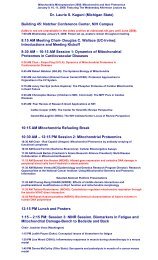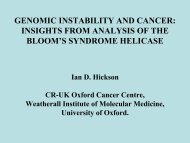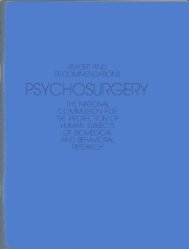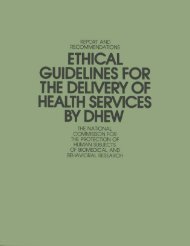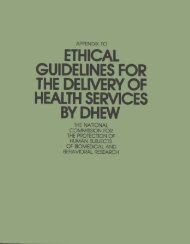RESEARCH ON THE FETUS - National Institutes of Health
RESEARCH ON THE FETUS - National Institutes of Health
RESEARCH ON THE FETUS - National Institutes of Health
Create successful ePaper yourself
Turn your PDF publications into a flip-book with our unique Google optimized e-Paper software.
LeRoy Walters, Ph.D.<br />
Dr. Walters surveys various ways <strong>of</strong> categorizing research on the fetus:<br />
(1) according to the condition <strong>of</strong> the fetus, (2) according to the chronological<br />
age <strong>of</strong> the fetus, and (3) according to the formal object <strong>of</strong> the research.<br />
He concludes that research on the fetus is not one but many things, and<br />
he focuses on nontherapeutic research on the fetus because it seems to raise<br />
serious public policy questions, and on research before, during and after<br />
induced abortion since that is a primary concern <strong>of</strong> the Commission's authorizing<br />
legislation. Four possible positions can be developed with respect to such<br />
research. Dr. Walters defends the position that nontherapeutic research on the<br />
fetus should be permitted only to the extent that such research is permitted on<br />
children or on fetuses which will be carried to term.<br />
The essay endorses McCormick's thesis that parents may properly consent<br />
to a child's participation in nontherapeutic research which the child should<br />
be willing to take part in if the child were able to consent. This position<br />
is extended to cover the prenatal period as well. Because <strong>of</strong> difficulties<br />
associated with consent in cases where an abortion decision has been made, nontherapeutic<br />
research procedures should be permissible in the case <strong>of</strong> fetuses<br />
before or after abortion to the extent that they are permissible in the case <strong>of</strong><br />
fetuses which will be brought to term. This position supposes that there is<br />
substantial continuity between previable and viable fetal life and postnatal life.<br />
Although public policy making includes an ethical component, it also<br />
includes other factors, such as continuity with generally accepted societal<br />
principles, accommodation <strong>of</strong> a variety <strong>of</strong> belief systems and interests, and<br />
clearly understandable formulation. Three public policy propositions are<br />
recommended, all <strong>of</strong> which are based upon a policy <strong>of</strong> equality <strong>of</strong> treatment for<br />
all categories <strong>of</strong> human subjects: (1) nontherapeutic research on children<br />
should be permitted, if such research involves no risk or only minimal risk to<br />
subjects; (2) nontherapeutic research on fetuses which will be carried to term<br />
should be permitted, if such research involves no risk or minimal risk to the<br />
subjects; (3) nontherapeutic research procedures which are permitted in the<br />
case <strong>of</strong> fetuses which will be carried to term should also be permitted in the<br />
case <strong>of</strong> (a) live fetuses which will be aborted and (b) live fetuses which have<br />
been aborted.<br />
38



